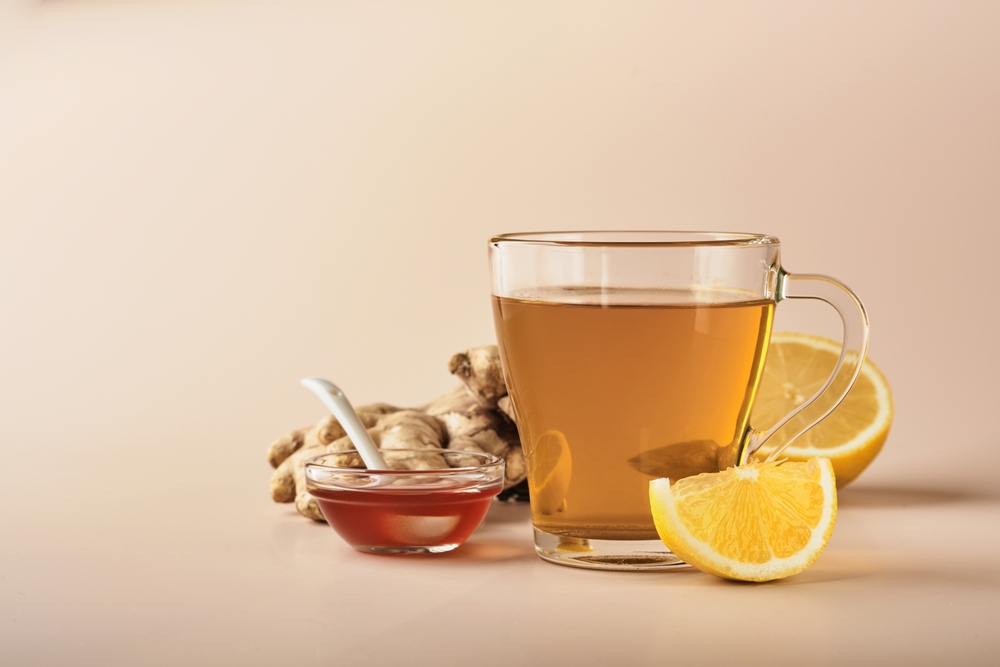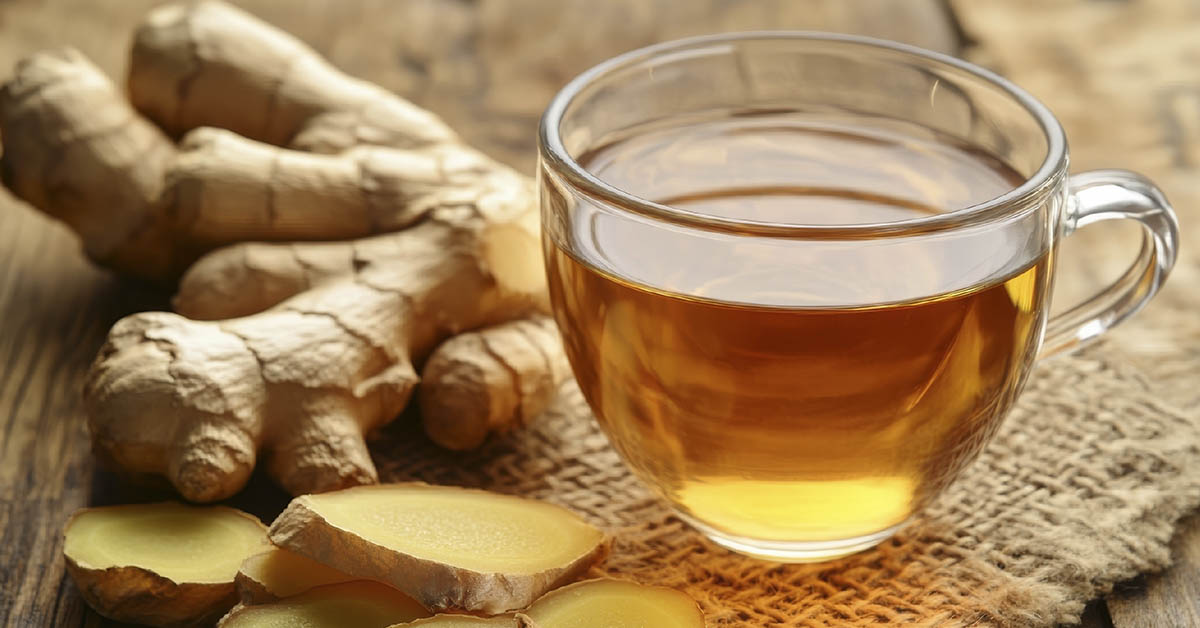Ginger has long been praised for its powerful health benefits and has been used for centuries against many different illnesses, infections, and conditions. Many of these health benefits have since been backed up by various studies and research, confirming ginger’s status as a health-promoting ingredient. One of the easiest ways to incorporate ginger into your daily diet is by drinking ginger tea. These are the proven benefits of ginger tea so you can start experiencing them now.
The Benefits of Ginger Tea

Ginger tea is tasty, warming, and cozy. It can be your best friend when you need some extra help with digestion, when you have a sore throat, or simply when you want a warming, caffeine-free beverage. You may be aware of some of the benefits of ginger tea, however, there are many benefits that may surprise you.
1. Weight Loss Support

If you are looking for some extra support along your weight loss journey, ginger tea is here to provide that for you. Research suggests that ginger may play a significant role in weight loss. Studies have shown that ginger supplementation can reduce body weight, waist-to-hip ratio, and hip ratio in individuals who are overweight or obese. This could be attributed to ginger’s ability to reduce inflammation, making it a potential ally in weight management efforts.
Read More: Ginger, Lemon, ACV, and Cinnamon: A Simple Blend of Ingredients to Support Your Health
2. Pain Relief for Osteoarthritis

Ginger is a well-known anti-inflammatory, therefore long it has been used to aid inflammatory conditions. This spice has shown promising results in reducing pain associated with osteoarthritis. Individuals suffering from joint pain and stiffness may find relief with the consumption of ginger tea. However, more research is needed to fully understand the extent of ginger’s impact on osteoarthritis symptoms.
3. Blood Sugar Management

For individuals with type 2 diabetes, ginger tea may help in both lowering and managing blood sugar levels. There have been some studies to indicate a significant reduction in fasting blood sugar, as well as HbA1c levels in diabetic patients who consumed ginger supplements regularly. Though a ginger supplement may be higher in concentration than ginger tea, there will likely still be some benefits to consuming the drink. That, and likely less potential side effects than would be associated with a supplement.
4. Digestive Health Support

Ginger is one of the best things you can consume for digestive support. Drinking ginger tea can aid in supporting digestive health, particularly for individuals with irritable bowel syndrome (IBS) and inflammatory bowel disease (IBD). The properties of ginger, including promoting gastric motility, stimulating digestive juices, and relieving gastrointestinal discomfort, make it a valuable addition to promote gut health.
5. Menstrual Pain Relief

Menstrual pain – aka cramps – is no fun. It can really ruin your day and make you fairly miserable. Women experiencing dysmenorrhea or menstrual pain may benefit from ginger tea. Research suggests that ginger is as effective as certain pain-relief medications in alleviating menstrual discomfort. Further studies are needed to explore the full potential that ginger has in managing menstrual pain.
6. Cholesterol Regulation

Drinking ginger tea may have a positive impact on cholesterol levels. Studies have shown that ginger consumption can help to reduce triglycerides and LDL cholesterol. It does this while also simultaneously increasing HDL cholesterol, which is considered beneficial for heart health.
7. Anticancer Properties

Ginger is a powerful root that contains compounds that exhibit potential anti-cancer properties. Research indicates that gingerol and other antioxidant compounds in ginger may help prevent the growth of cancer cells. That being said, more clinical trials are required to validate these findings and establish the full extent of ginger’s anticancer benefits.
Read More: 7 Reasons You Should Drink Ginger Juice in the Morning
8. Infection Fighting Abilities

Drinking ginger tea for cold, flu, and sore throat is probably something that your mother or grandmother had you do. They may have not known the science behind it, but they were right to have you drink ginger tea when you were sick. Ginger’s antiviral and antibacterial properties make it a valuable asset in fighting infections. Compounds found in ginger, such as gingerol, have been shown to inhibit the growth of various bacteria and viruses. Drinking ginger tea can potentially enhance your body’s immune response to infections.
9. Nausea Treatment

Nausea can sneak up on you, whether it’s riding in a car on a winding road, morning sickness while pregnant, or simply you’re not feeling super well that day. Ginger tea is well-known for its ability to alleviate nausea and motion sickness. Whether you’re experiencing morning sickness during pregnancy or feeling queasy after a long journey, a soothing cup of ginger tea can help settle your stomach and provide relief from nausea. As always, if pregnant, speak to your doctor about what is and isn’t right for you.
10. Brain Function Enhancement and Alzheimer’s Disease Protection

The bioactive compounds in ginger have been linked to improved brain function and potential protection against Alzheimer’s disease. Research suggests that ginger may enhance cognitive function, memory, and attention. Furthermore, the anti-inflammatory and antioxidant properties of ginger could play a role in neuroprotection, offering promising avenues for further research into Alzheimer’s prevention.
How To Make Ginger Tea

Yes, you can buy ginger tea, in both loose-leaf and sachet varieties. These can still provide many health benefits, however, you have to be careful to research the company to ensure quality. Choosing organic is always the way to go. All of that said, it is relatively cheap and easy to just make your own ginger tea at home and is likely the best way to see benefits.
To make ginger tea, simply put ginger and lemons in a pot of hot water and simmer. The longer they simmer, the more of the flavor and benefits will be extracted. Pour the water into a mug and stir in some honey for a little bit of sweetness. Again, do your best to choose organic ingredients and always use filtered water.
The Bottom Line

Incorporating ginger tea into your daily routine is easy, inexpensive, and offers a long list of health benefits. From weight loss to potential anticancer and anti-Alzheimer’s properties, this is a drink that everyone should be sipping on regularly. As always, if you are pregnant, breastfeeding, or have existing health conditions, it is always a good idea to consult with your doctor before adding in something new. We are very excited to see where the continued research on ginger and the benefits of ginger tea takes us – and we’ll be sipping on a mug of it while we follow along.
Disclaimer: This information is not intended to be a substitute for professional medical advice, diagnosis or treatment and is for information only. Always seek the advice of your physician or another qualified health provider with any questions about your medical condition and/or current medication. Do not disregard professional medical advice or delay seeking advice or treatment because of something you have read here.
Read More: 8 Beauty Benefits of Ginger for Glowing Skin and Hair

